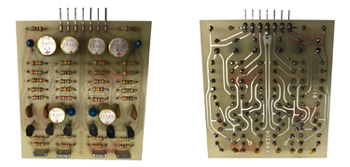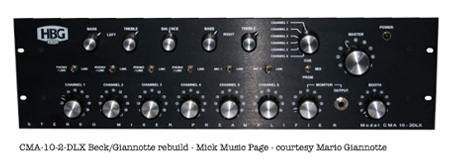
The history of the Bozak CMA-10-2DL: the first rotary DJ mixer
If it were not for Bozak brand (Norwalk, Connecticut), high fidelity DJing would have never been possible during the '70s.
Rudy Bozak, a former McIntosh Laboratories and Allen-Bradley employee, produced the CMA-10-2DL mixer-preamp recognized for pioneering the modern rotary style DJ mixing. Bozak collaborates with the german/american company Commercial Manufactured Audio (CMA) located in South Norwalk which was run by engineers Wayne Chou and Nick Morris. In mid '60s Chou and Morris began converting some P.A. line/microphone mono channels rotary mixers, as the Bozak 10-2, into phono/line stereo channels versions. One of these converted unit was renamed CMA-10-2D, now extremely rare, which becomes the precursor of the CMA-10-2DL model.

Bozak 10-2

Bozak CMA 10-2D
At that time Bozak also produced the model 919, a linear fader controlled home preamplifier, which was equipped with a cue section, 2 phono stereo inputs,6 stereo inputs, 6 stereo outputs, separate left/right 3 band equalizer. The model 919 was a popular good sounding preamplifier in the United States, but increasing demand for integrated amplifiers caused a loss in sales.
Bozak then plan on using the 919's finest Frako caps equipped phono cards on the CMA-10-2D. Thus the mixer was renamed CMA-10-2DL in its acclaimed worldwide disco version.

Bozak 919 preamplifier

Bozak 919 / CMA-10-2DL phono card

Bozak CMA-10-2DL (silver)

Bozak CMA-10-2DL (black)
In mid '70s the CMA-10-2DL had already reached the quote of the standard club mixer status. It was all discrete unit built up from the ground using resistors, capacitors and transistors. Before the internal summing, the signal path was keep fully passive with unbuffered volume channel controls. The original potentiometers were Allen-Bradley "Type J”. Since the Allen- Bradley were not suitable with long term heavy DJ use, the potentiometers were definitively replaced in 1979/1980 by a custom model of ALPS RK40 "Black Beauty" specifically modified by the japanese ALPS company according to Bozak's audio slope gain requirements. These custom RK40 was guaranteed for 1.000.000 of cycles, far more durable than Allen-Bradleys. Every component was carefully selected to reach the best sound as possible. Richard Long (R.L.A. Audio) was responsible for the "effect-loop" insert point connection, which was added into the design at his request. The Bozak mixer has a warm and mellow sound, never harsh or fatiguing. In early '80s the Bozak company stops the production, but Bozak's engineers Buzzy "The Buzzard" Beck and Paul Hammarlund carried on the assembly of CMA-10-2DL mixers, including some optional versions such CMA-10-2DLA and CMA-10-2DLS. Urei/JBL being ispiring to the Bozak form-factor, realeses the integrated circuit based model 1620 rotary mixer in 1983.
Latest Bozak mixer original rebuilds and prototypes:

Bozak CMA-10-2DLS (the last mixer shipped from Bozak factory built and signed by Paul Hammarlund)

Bozak CMA-10-2DLB

Bozak CMA-10-2DLBS

Bozak HB-1-8A (1982 prototype)

Bozak CMA-10-2DLC

Bozak CMA-10-2DLX












